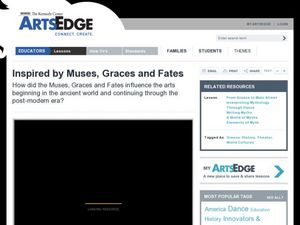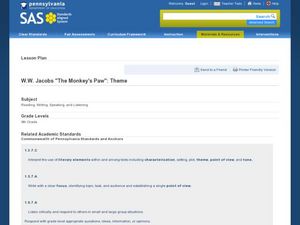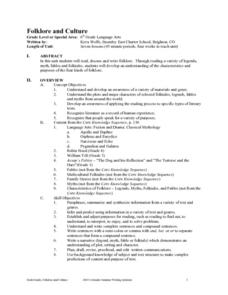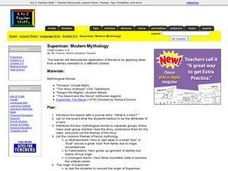Curated OER
Are You the Master of Your Fate?
Use contemporary nonfiction in order to develop empathy and examine the power an individual has over his destiny.
Curated OER
Manifest Destiny
In this United States history worksheet, students utilize a word bank of 10 terms or phrases to answer 10 fill in the blank questions pertaining to Manifest Destiny. A short answer question is included as well.
Curated OER
Inspired by Muses, Graces and Fates
Students examine how artists express the Muses through the arts. In this art and history lesson plan, students work cooperatively to identify the Greek Muses, Graces and the Fates. Students will identify the attributes of each,...
Maryland Department of Education
The Concept of Diversity in World Literature Lesson 12: Author's Purpose - Yeats and Achebe
Is there such a thing as fate/luck? Can one fight destiny? As part of their study of Chinua Achebe's purpose in writing Things Fall Apart, class members answer these questions from Achebe's point of view and then from William Butler...
EngageNY
Grade 9 ELA Module 2, Unit 2, Lesson 16
Was Oedipus' destiny determined by fate or by his actions? Using details from the text, ninth graders delve into a critical thinking exercise based on Sophocles' Oedipus the King. Now that Oedipus has learned his true identity, readers...
Curated OER
W.W. Jacob's "The Monkey's Paw" Theme
Students identify the theme of "The Monkey's Paw" and relate it to prior knowledge. In this "The Monkey's Paw" instructional activity, students discuss fate and coincidence and debate which one controls destiny. A test is chosen as the...
Curated OER
Folklore and Culture
Sixth graders explore the four kinds of folklore in this seven lesson unit. Through reading a variety of legends, muths, fables, and folklores the concepts pf the lessons are synthesized byStudents.
Curated OER
Superman: Modern Mythology
Students discuss what characteritics belong to a hero. They examine different mythological stories and identify the theme of each. They compare and contrast the origin of Superman to the mythological stories and report their findings to...
Curated OER
Black Separatism or the Beloved Community? Malcolm X and Martin Luther King, Jr.
Students interpret historical evidence presented in primary and secondary resources. In this African American history lesson, students compare and contrast the tactics employed by Malcolm X and Martin Luther King,...
Curated OER
Classical Greece and Rome
Covering the playwrights and characteristics of ancient Greek dramas, this presentation would be a good starter to a unit about the culture or about the genre of tragedies. Though titled "Classical Greece and Rome," there isn't any...
Curated OER
Antigone Questions
In this reading comprehension worksheet, students respond to 6 short answer and essay questions based on Antigone by Sophocles.
Curated OER
The Alchemist by Paulo Coehlo
In these literature analysis worksheets, students read The Alchemist by Paulo Coehlo and complete pre-study discussion, reflection, and writing activities.
Curated OER
Paper Masks/Heads
Middle schoolers examine the processes and beliefs used by different cultures to create works of art. Using the internet, they research the types of arts used by cultures that have been transmitted to future generations. They use...
Curated OER
"Be the Kiwi"- Whale Rider
Students discuss examples of foreshadowing and find information about the Maori culture in Whale Rider. In this Whale Rider lesson, students define foreshadowing and find examples. Students evaluate whether or not they feel the story...















